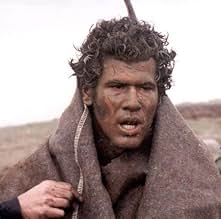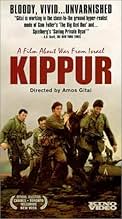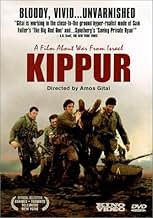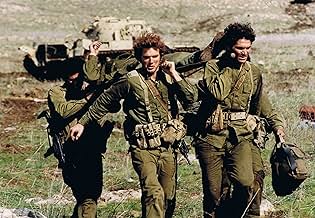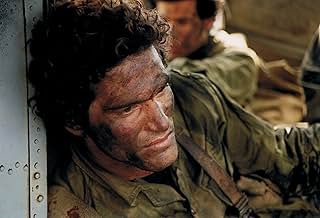NOTE IMDb
6,3/10
2 k
MA NOTE
Lorsque la guerre du Kippour éclate, deux soldats israéliens se retrouvent dans l'incapacité de localiser leur unité. Désireux de participer à l'effort de guerre, ils rejoignent une unité d'... Tout lireLorsque la guerre du Kippour éclate, deux soldats israéliens se retrouvent dans l'incapacité de localiser leur unité. Désireux de participer à l'effort de guerre, ils rejoignent une unité d'évacuation médicale aéroportée.Lorsque la guerre du Kippour éclate, deux soldats israéliens se retrouvent dans l'incapacité de localiser leur unité. Désireux de participer à l'effort de guerre, ils rejoignent une unité d'évacuation médicale aéroportée.
- Réalisation
- Scénario
- Casting principal
- Récompenses
- 2 victoires et 6 nominations au total
Uri Klauzner
- Dr. Klausner
- (as Uri Ran-Klausner)
Juliano Mer-Khamis
- The Captain
- (as Juliano Mer)
Liat Glick
- Dina
- (as Liat Glick Levo)
Noah Faran
- Rescue Commander
- (as Noach Faran)
Avis à la une
This is not a Hollywood film, and not an action film by any means. Its an art film, just look at the opening love making sequence. Two characters making love sopping in paint on Yom Kippur while everyone else takes part in religious activities. You dont get much more sac-religious than this. So we know this is not a propoganda film.
Despite its boredom and such, when compared to other "anti-war" films like platoon and such, this is king. Why? Because there is nothing glorifying about it or the characters, its boring, there is not a single gunshot in the whole film. Rather we spend 2 hours following a medical rescue team in a chopper hauling dead and wounded bodies into a chopper. No heroic sacrifice, no barely dodging bullets and RPG's, no cool action sequences at all. Israel needs more films like this, to see the futility of fighting wars like this. The use of long shots puts us on the outside looking in on the film, and the use of long takes helps us observe these events in real time. Specifically with the stuck in the mud scene. THe one character ironically says "this earth, this sH^&*^" When the Israeli ideology is so focused on a spiritual connection with the land, the land they feel entitled to.
Its about time that Anti-war films actually institute a feeling of real social change, and not pretend to be anti-war films conveying sacrifice and a "it was worth it" ideal. Real anti-war films do not just show the horror of blood and guts and death, they show the futility of it completely. And they are very difficult for the viewer to accept for the first time.
Despite its boredom and such, when compared to other "anti-war" films like platoon and such, this is king. Why? Because there is nothing glorifying about it or the characters, its boring, there is not a single gunshot in the whole film. Rather we spend 2 hours following a medical rescue team in a chopper hauling dead and wounded bodies into a chopper. No heroic sacrifice, no barely dodging bullets and RPG's, no cool action sequences at all. Israel needs more films like this, to see the futility of fighting wars like this. The use of long shots puts us on the outside looking in on the film, and the use of long takes helps us observe these events in real time. Specifically with the stuck in the mud scene. THe one character ironically says "this earth, this sH^&*^" When the Israeli ideology is so focused on a spiritual connection with the land, the land they feel entitled to.
Its about time that Anti-war films actually institute a feeling of real social change, and not pretend to be anti-war films conveying sacrifice and a "it was worth it" ideal. Real anti-war films do not just show the horror of blood and guts and death, they show the futility of it completely. And they are very difficult for the viewer to accept for the first time.
The Yom Kippur war almost caught Israel unawares. Twenty days later they were across the Suez 100km from Cairo and near as many from Damascus, another disaster for the Arabs. In a strange turn of events however, the surprise attack and doom-laden buildup to it, with thousands of graves dug in anticipation, had a devastating effect on the country, in effect signaling a perpetual state of fear and alert.
I am in the middle of exploring through films these bumps in the national mind, which brought me here. For what it's worth, the filmmaker has decided to capture an experience of war as purely about what it means to be there as he can. He knows, he was there.
Sadly, it's flat beyond belief. For better or worse I found it to be nothing like Thin Red Line, as others have mentioned in their comments. Whereas Malick spins war to be one of conflicting urges in the soul, this is what we see, two hours of med- evacs carrying the wounded.
There's one contemplative image in the film, a helo shot of a muddy battlefield with maneuvering tanks drawing meaningless patterns on the mud, contrasted with the early shot of the lush mingling of painted sex evocative of life, color, imagination, spontaneity. It's a great shot, and perfectly describes both what the film wants to portray, a sort of aimless cosmos, and what it ends up with—aimless doodling on the ground.
So the filmmaker reminisces in film about a time and place that allowed no skyward gaze. The important message is that war is as wasteful and pointless to happen in real life as it is to watch in this film.
I am in the middle of exploring through films these bumps in the national mind, which brought me here. For what it's worth, the filmmaker has decided to capture an experience of war as purely about what it means to be there as he can. He knows, he was there.
Sadly, it's flat beyond belief. For better or worse I found it to be nothing like Thin Red Line, as others have mentioned in their comments. Whereas Malick spins war to be one of conflicting urges in the soul, this is what we see, two hours of med- evacs carrying the wounded.
There's one contemplative image in the film, a helo shot of a muddy battlefield with maneuvering tanks drawing meaningless patterns on the mud, contrasted with the early shot of the lush mingling of painted sex evocative of life, color, imagination, spontaneity. It's a great shot, and perfectly describes both what the film wants to portray, a sort of aimless cosmos, and what it ends up with—aimless doodling on the ground.
So the filmmaker reminisces in film about a time and place that allowed no skyward gaze. The important message is that war is as wasteful and pointless to happen in real life as it is to watch in this film.
As an Israeli's view of war, "Kippur" takes "Thin Red Line"s visual approach, with little plot or explication or context, from the sacred (Yom Kippur mis en scene) to the procreative beginning, to the wounds and exhausted faces of the soldiers.
This is a war where a soldier takes his used Fiat right up to the front and back again to his girlfriend's front door. Unlike "Tigerland" where the soldiers are young neophytes with taut basic training bodies, these are lean, lanky, long-haired chain-smoking, experienced reservists who pretty much pick and choose where they'll serve. Instead of the usual U.S. barking sergeant, this unit is based on long-term friendship, training, coordination, shared goals and consensus. Fodder for discussion on military management styles. And I can't think of another war movie where a guy named Weinraub is as sexy looking.
Even my husband, who is a devotee of the War Channel and thought it was way too arty (and amazingly this was from the same director who did the agit-prop anti-Orthodox domestic drama "Kadosh") found one long sequence with almost no dialog very effective, as the medics try to rescue the wounded in the mud.
The projectionist shut down the credits before it was finished.
(originally written 12/2/2000)
This is a war where a soldier takes his used Fiat right up to the front and back again to his girlfriend's front door. Unlike "Tigerland" where the soldiers are young neophytes with taut basic training bodies, these are lean, lanky, long-haired chain-smoking, experienced reservists who pretty much pick and choose where they'll serve. Instead of the usual U.S. barking sergeant, this unit is based on long-term friendship, training, coordination, shared goals and consensus. Fodder for discussion on military management styles. And I can't think of another war movie where a guy named Weinraub is as sexy looking.
Even my husband, who is a devotee of the War Channel and thought it was way too arty (and amazingly this was from the same director who did the agit-prop anti-Orthodox domestic drama "Kadosh") found one long sequence with almost no dialog very effective, as the medics try to rescue the wounded in the mud.
The projectionist shut down the credits before it was finished.
(originally written 12/2/2000)
Those here who have bashed the film have grossly misunderstood Kippur. Either they look for a blow-blam-bang Holy-wood flick, which it isn't; or for a highly reliable reconstruction (which Save Private Ryan, extolled by some, is only in part: the first scene is almost like-it-really-was, the last scene is blow-blam-bang with Matt Damon and Tom Hanks instead of Chuck Norris and Steven Seagal). Kippur is a highly personal film, in that war is filtered through the very personal point of view of a sophisticated director. Amos Gitai is close to Antonioni; and in directing a war movie he couldn't forget the Lesson of the Master. Hence the minimal dialogue, hence the dilated times, hence the attention to the setting more than the characters. You try to watch Deserto rosso and then Kippur and you'll notice just how much they have in common. Then, if you don't like Antonioni, it's your own business, go for the blow-blam-bang stuff. However, as for action movies, I think Black Hawk Down is better than SPR. I may be wrong...
When the siren sounds the two main characters head off to do their part for the Israeli state. The bookends on the movie place the context of war as an eventuality that, like working, has to be done. The action doesn't take place at the front but with a medical evac unit who's cleaning up the wounded after the action has moved on. My two reasons for liking this film are the creative camera work and the battlefield sounds and visuals. Early in the film when they're looking for their unit they do accidentally drive right into the front lines and the viewer (camera) is placed right in the back seat of their Fiat as they scramble to get turned around. My one complaint. The characters lack development. Overall an enjoyable film.
Le saviez-vous
- AnecdotesThe film is based on director Amos Gitai's own experience of joining a helicopter rescue crew during the war of Kippur, and his helicopter being shot down by a Syrian missile on his 23rd birthday.
- GaffesMoshe Dayan did NOT lose his eye in the Sinai Desert; he lost it in Vichy-controlled Lebanon in 1941 on a reconnaissance mission on behalf of the Australian/British Army.
- ConnexionsFeatured in Sodankylä ikuisesti: Elokuvan vuosisata (2010)
Meilleurs choix
Connectez-vous pour évaluer et suivre la liste de favoris afin de recevoir des recommandations personnalisées
- How long is Kippur?Alimenté par Alexa
Détails
- Date de sortie
- Pays d’origine
- Sites officiels
- Langues
- Aussi connu sous le nom de
- Kippur
- Lieux de tournage
- Nehushtan, Tel Aviv, Israël(studio: house interiors)
- Sociétés de production
- Voir plus de crédits d'entreprise sur IMDbPro
Box-office
- Montant brut aux États-Unis et au Canada
- 114 283 $US
- Week-end de sortie aux États-Unis et au Canada
- 17 007 $US
- 5 nov. 2000
- Montant brut mondial
- 114 283 $US
- Durée
- 2h 4min(124 min)
- Couleur
- Mixage
- Rapport de forme
- 1.85 : 1
Contribuer à cette page
Suggérer une modification ou ajouter du contenu manquant


